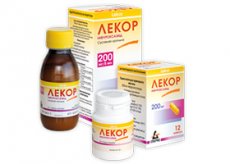Medical expert of the article
New publications
Preparations
Lecore
Last reviewed: 04.07.2025

All iLive content is medically reviewed or fact checked to ensure as much factual accuracy as possible.
We have strict sourcing guidelines and only link to reputable media sites, academic research institutions and, whenever possible, medically peer reviewed studies. Note that the numbers in parentheses ([1], [2], etc.) are clickable links to these studies.
If you feel that any of our content is inaccurate, out-of-date, or otherwise questionable, please select it and press Ctrl + Enter.

Lekor is an antimicrobial medication used to treat infections affecting the intestines. Contains the component nifuroxazide.
Indications Lecora
It is used in the following conditions:
- acute diarrhea of infectious origin;
- chronic colitis and enterocolitis of infectious etiology;
- combination therapy for intestinal dysbacteriosis;
- prevention of the development of infection in the gastrointestinal tract after surgery.
Release form
The therapeutic substance is released in capsules, 12 or 24 pieces per jar.
Pharmacodynamics
Nifuroxazide is an intestinal antiseptic, a derivative of the element 5-nitrofuran.
Demonstrates the active activity of a relatively large number of bacteria that provoke the appearance of infections inside the intestine (this also includes mutant strains that are resistant to other antimicrobial drugs):
- gram(+): staphylococci;
- gram(-): enterobacter, citrobacter, shigella with yersinia, intestinal bacteria with salmonella, klebsiella and proteus, as well as cholera vibrio.
It does not demonstrate activity against bacteria from the Pseudomonas and Proteus families (Proteus inconstans subtype), and also against strains from subcategory A of the Providentia alcalifaciens family.
There is an assumption that the drug slows down the activity of dehydrogenases and destroys protein binding in pathogenic microbes. When using average therapeutic doses, it develops a bacteriostatic effect, and when used in increased doses, it develops a bactericidal effect. The medicinal effect is noted from the first hours of therapy.
Therapeutic doses of the drug almost do not disturb the balance of intestinal microflora. The drug does not cause the emergence of resistant strains of pathogenic bacteria and cross-resistance with respect to other antimicrobial drugs, due to which, if necessary, it can be prescribed in combination therapy together with general drugs for infections of a generalized nature.
When used for intestinal infections of viral etiology, it prevents the occurrence of bacterial superinfection.
Pharmacokinetics
The drug taken is almost not absorbed inside the gastrointestinal tract, forming a high indicator of the therapeutic element inside the intestine. Such pharmacokinetic parameters lead to the development of only enteral disinfecting effect; the drug does not have a general antibacterial effect and does not lead to the appearance of general toxic signs.
The drug is excreted with feces. The drug does not affect the biochemical and clinical parameters of the blood.
Use Lecora during pregnancy
When using nifuroxazide in pregnant women, no embryotoxic or teratogenic activity was observed, but due to the lack of an adequate number of tests of the drug during pregnancy, it is permitted to use it only with the prescription of a doctor and under his supervision (in situations where the probable benefit is more expected than the risks to the fetus).
There is evidence that nifuroxazide is not absorbed in the gastrointestinal tract and does not pass into breast milk, but there is not enough clinical data, so Lekor is prescribed during lactation with great caution.
Side effects Lecora
Lekor is usually tolerated without complications; only occasionally such symptoms as nausea, transient abdominal pain, increased diarrhea and vomiting appear. If symptoms associated with the gastrointestinal tract develop and are of low intensity, there is no need to use special treatment or stop administering nifuroxazide, because these symptoms disappear on their own.
In people with intolerance to nitrofuran derivatives, granulocytopenia may occur. Allergy symptoms are usually epidermal (itching, pustulosis, urticaria and rashes). Rarely, as with other nitrofuran derivatives, severe intolerance symptoms (including anaphylaxis and Quincke's edema) and dyspnea may develop.
If severe side effects occur, the drug should be discontinued and symptomatic measures should be taken. The patient should also stop using nifuroxazide and other nitrofuran derivatives in the future.
Storage conditions
The medicine must be stored in a place closed to small children. Temperature values are in the range of 25°C.
Shelf life
Lekor can be used within a 2-year period from the date of manufacture of the pharmaceutical product.
Application for children
The capsules of the drug can only be used in children over 7 years of age.
For children of a younger age group, it is necessary to use the medicine in the form of a suspension.
Analogues
Analogues of the drug are Stopdiar, Intetrix, Entoban with Nifuroxazide and Enterofuril.
Attention!
To simplify the perception of information, this instruction for use of the drug "Lecore" translated and presented in a special form on the basis of the official instructions for medical use of the drug. Before use read the annotation that came directly to medicines.
Description provided for informational purposes and is not a guide to self-healing. The need for this drug, the purpose of the treatment regimen, methods and dose of the drug is determined solely by the attending physician. Self-medication is dangerous for your health.


 [
[